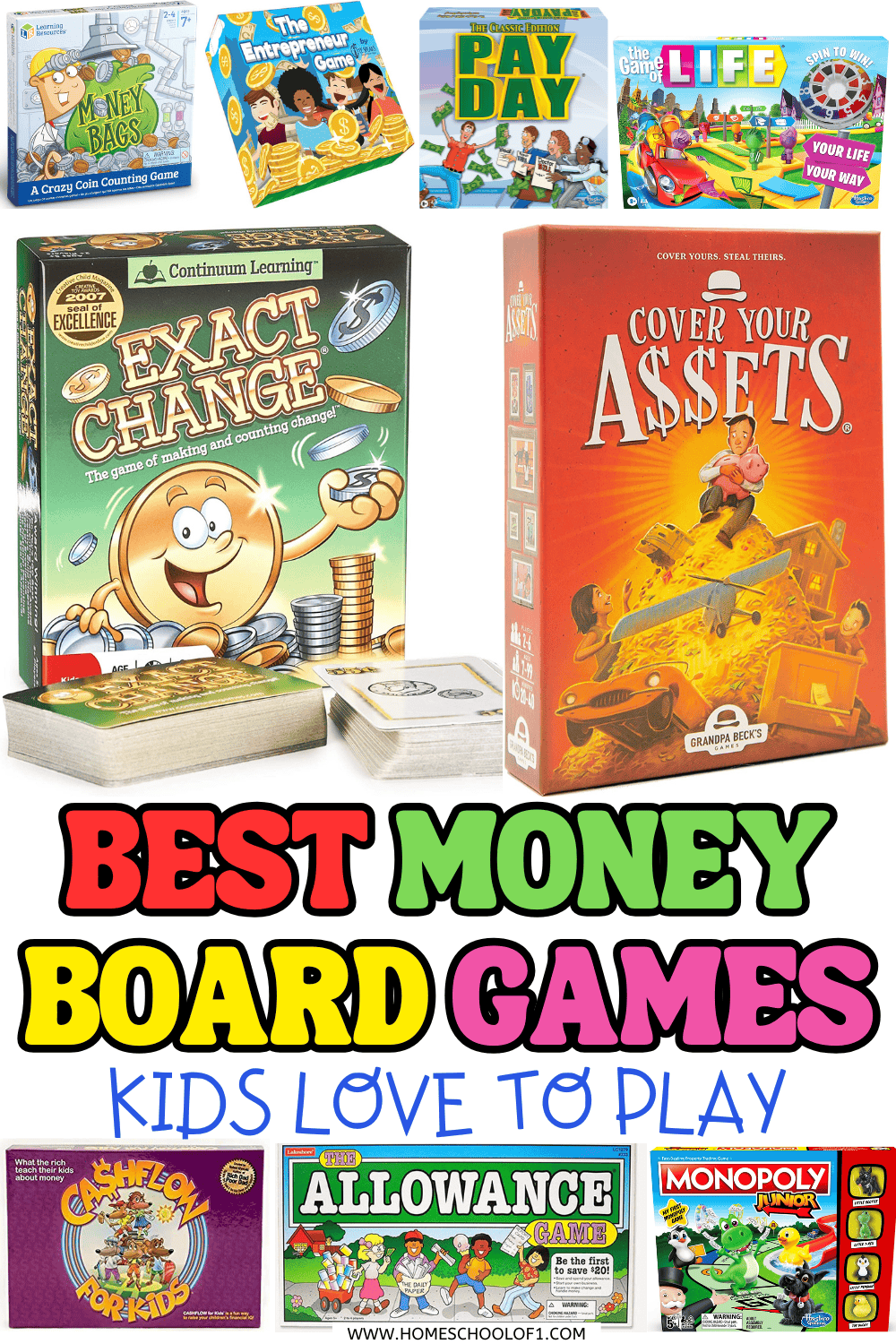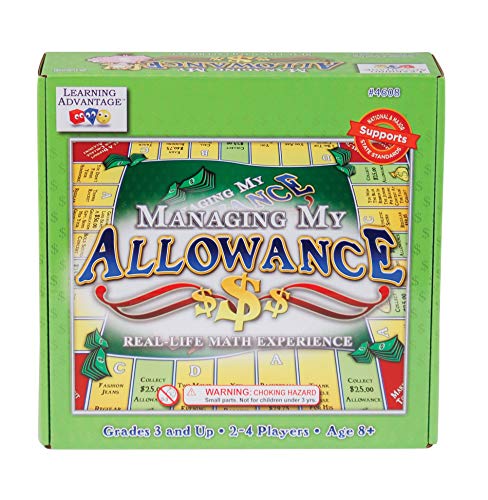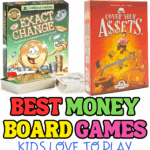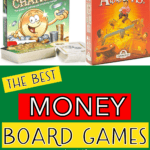Money board games are one of the easiest ways to teach kids about real-life financial skills while still keeping the focus on fun.
Instead of worksheets or lectures, these games let children practice making change, saving allowances, and planning ahead in a hands-on way.
Over the years, I’ve seen how quickly my son picked up concepts like budgeting and smart spending when we played together.
What I love most is that these board games for kids work in so many settings, family game nights, homeschool lessons, or even small group activities in the classroom.
**This post may contain affiliate links. As an Amazon Associate and a participant in other affiliate programs, I earn a commission on qualifying purchases.**
Financial Literacy Board Games That Build Real-Life Skills
There are plenty of board games that weave money lessons into play, from quick card games to longer strategy challenges.
Below you’ll find our favorites for different ages, each one bringing math and financial concepts to life in a fun way.
Monopoly Junior
We’ve played Monopoly Junior countless times, and it’s become a favorite in our house. It simplifies the traditional Monopoly experience, with fewer rules and smaller numbers, making it easy for younger kids to grasp. My child loves collecting properties and handing out “rent” – without even realizing he’s practicing early math! This version works well as an introduction to concepts like buying, selling, and handling small sums.- Players: 2-4
- Age: 5+
- Tip: Use this game to spark conversations about saving for future rounds versus spending immediately.
Related: Printable money memory game
Read More
Money Bags Coin Value Game
This game is a fantastic way to reinforce coin recognition and counting skills. We noticed that after a few rounds, our child was much quicker at identifying coins and adding them up. It turns learning into a race—something our competitive little one really enjoys! Plus, it introduces the idea of exchanging coins, which is a useful skill when learning real-world money management.- Players: 2-4
- Age: 7+
- Pro Tip: Let your child act as the “banker” to boost their confidence in handling money.
Related: Shopping math worksheets
Continue Reading
Cover Your Assets
This card game mixes luck and strategy in a way that always gets our family laughing. The first time my son lost his whole pile of “assets,” he was upset, but it turned into a great conversation about bouncing back after setbacks. It’s fast-paced and silly, but it quietly teaches kids to think ahead and protect what they’ve earned.Players: 2-6Age: 7+Note: Perfect for kids who enjoy competition, as long as they’re ready to handle the ups and downs.
Read More
Pay Day
This simple yet engaging game does a great job of demonstrating how money flows in and out—just like in real life. My child quickly picked up the idea that earning isn’t enough; it’s about managing what you have. It’s become a go-to for us when we want to mix fun with practical learning. The best part? Pay Day plays quickly, making it perfect for shorter game nights.- Players: 2-4
- Age: 8+
- Tip: Use this game to introduce the concept of budgeting in a fun way.
Related: Free money worksheets
Continue Reading
The Game of Life
Life has been on our shelf for years, and it always sparks real-world conversations. When my son chose to go to college in the game, we ended up talking about tuition, loans, and why some jobs require extra schooling. Those little decisions in the game mirror bigger choices in life, and kids get to see how planning (or not planning) affects the outcome.Players: 2-4Age: 8+Suggestion: A fun way to introduce older kids to long-term goals like saving, investing, and career planning.
Read More
Exact Change Card Game
This simple but fun game is a favorite in our house. It’s perfect for reinforcing money-counting skills and gives kids plenty of practice making exact change. Matching coins during gameplay has helped my child build confidence with real-world transactions. It’s also fast-paced, which keeps everyone engaged.
Read More
What’s in the Bank?
This game stands out with its fun rhyming cards and a mix of strategy and luck. It’s interactive and encourages kids to think quickly, block opponents, or steal their earnings—introducing them to financial competition. While designed with adults in mind, younger kids can enjoy it with guidance, making it a great option for family game nights.- Players: 2-6
- Age: 6+
- Note: It’s great for kids who love games with a playful twist, thanks to the fun rhyming mechanics.
Continue Reading
Managing My Allowance Money Game
This game offers more than just fun—it teaches kids the difference between wants and needs while helping them manage wages and allowances from real-life tasks. My child loves keeping track of earnings on the included financial record, which makes saving feel like a real achievement.- Players: 2-4
- Age: 8+
- Tip: Pair this game with real-life allowance tracking to reinforce the lessons.
Read More
Monopoly Ultimate Banking Edition Board Game
This version of Monopoly swaps paper money for debit cards and a banking unit, and my son thought the card scanner was the coolest part. It felt a lot more like what he sees at the store, which made it easy to talk about digital payments and the differences between cash and cards. It’s still Monopoly, but the modern twist keeps it fresh and more connected to real life.Players: 2-4Age: 8+Tip: Use this one to start conversations about how we pay for things today versus when we were kids.
Read More
Rich Dad CASHFLOW for Kids
Inspired by Rich Dad Poor Dad, this game introduces kids to the principles of cash flow and smart investing. It simplifies financial concepts like passive income, making it easy for young players to grasp. We love how it emphasizes the importance of long-term planning and thinking beyond just earning a paycheck.- Players: 2-6
- Age: 6+
- Pro Tip: Pair it with a discussion about budgeting or allowances for added value.
Read More
Big Money Family Board Game
This game has become a hit at our house! With options to invest in candy factories or high-tech labs, kids quickly get the hang of how investments can grow (or shrink). It’s lighthearted, fast-paced, and filled with opportunities to talk about financial risk-taking in a playful way.- Players: 2-5
- Age: 8+
- Note: Perfect for kids who enjoy strategy mixed with a little silliness.
Read More
The Entrepreneur Game
We pulled this game out when my son was curious about running a lemonade stand, and it gave him a bigger picture of what it takes to manage a business. Between loans, marketing, and keeping track of expenses, he realized quickly that profits don’t come without planning. It’s a little more advanced, but it’s a fun way for kids to step into the shoes of a business owner.Players: 2-6Age: 12+Tip: Pair this game with a real-life project, like tracking earnings from chores or a small side hustle.Related: Financial literacy books for middle school students
Read More
Exchange
This game simulates the ups and downs of trading, encouraging strategic thinking and quick decision-making. We’ve had fun seeing who could corner the market during family game night! It’s great for introducing concepts like supply and demand in an approachable way.- Players: 3-6
- Age: 10+
- Pro Tip: Follow up with a conversation about current stock trends to connect the game with real-world finance.
Read More
Rich Dad CASHFLOW
This version of CASHFLOW is ideal for teens ready to take their financial knowledge to the next level. It covers concepts like escaping the “rat race” and building passive income streams. It’s a bit more complex but offers a rewarding experience for older players.- Players: 2-4
- Age: 14+
- Note: This game pairs well with lessons on personal finance and investment strategies.
Read More
Bulls and Bears – Strategy Board Game
Bulls and Bears teaches financial planning through saving, spending, and investing. It’s a great tool for introducing kids to stock market concepts and the difference between bullish and bearish market strategies. We’ve found it helpful for starting conversations about financial trends.- Players: 2-6
- Age: 14+
- Pro Tip: Use this game as an opportunity to explain financial news and market trends in simple terms.
Read More
Cash ‘N Guns Party Game
This game brings out the inner gangster (in a playful way) with foam pistols and competitive strategies. While it’s lighthearted, it’s important to emphasize that it’s purely for fun. We’ve found that older kids enjoy the humor and strategy, but we wait until about age 12 to play, so everyone understands the difference between the game and reality.- Players: 4-8
- Age: 10+ (Recommended 12+)
- Note: A fun way to introduce negotiation skills, but play with care.
Read More
Stock Exchange Game
With three levels of play, this game is adaptable for families and more advanced players. It’s based on real stock market principles, making it a fantastic learning tool for kids interested in finance. We like how it allows for different strategies, from conservative to aggressive investing.- Players: 2-6
- Age: 10+
- Pro Tip: Use it as a starting point for talking about how investments grow over time.
Read More
Last Updated on 21 October 2025 by Clare Brown






















